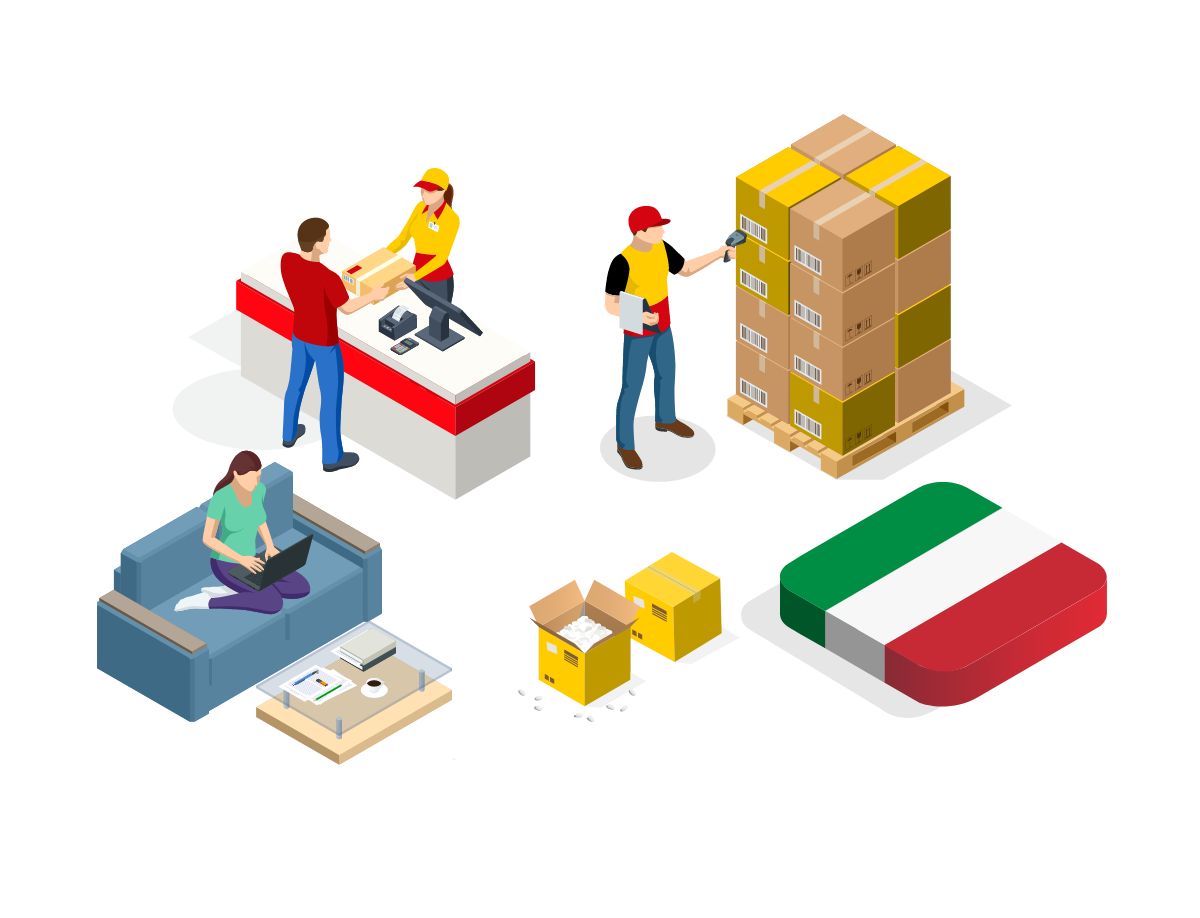Italy – renowned for its rich history, vibrant culture, and discerning consumers – presents an excellent opportunity for e-commerce companies looking to expand into new markets.
This is your guide to exporting to Italy, Europe’s fourth-largest e-commerce market. From understanding the growth potential of the market to navigating popular platforms and key shopping events, we will equip you with the knowledge you need to succeed.
Market Overview: Italy's e-commerce landscape

12.23% E-commerce Growth
Italy’s e-commerce sector is growing fast, above the global average of 11%; between 2023-2027, e-commerce growth in Italy is set to hit 12.23% CAGR (compound annual growth rate). (1)

40 million online shoppers
Driven by the COVID-19 pandemic, e-commerce in Italy has taken off in recent years. Today, two-thirds of the country’s 60 million people shop online. (3)

67% of web-shoppers make purchases from international websites
In 2021, 67% of Italians purchased from international websites (2). This is a great indicator of a market that is happy to buy products from cross-border retailers.
Most visited e-commerce marketplaces in Italy
Where should you sell online in Italy?4
The Italian local site of the global retail giant.
An Italian online marketplace that allows users to buy and sell a wide range of products including cars, furniture, electronics, and more.
Ebay.it is the Italian version of the globally popular retail website. Famous for second-hand items, this marketplace is also great for direct-to-consumer products.
Offers a wide range of products including clothing, electronics, home appliances, and more.
Major fashion and accessories marketplace website.
With a focus on fashion and lifestyle products, Zalando is a popular choice for Italian shoppers.
Sector-specific platforms
Some of the most popular online destinations by sector:
- Travel and tourism: Booking.com, eDreams, Expedia, Italo Treno, Kayak, lastminute.com, Opodo, Skyscanner, Trenitalia, Tripadvisor, Trivago, and Volagratis
- Information technology and consumer electronics: ePRICE, Euronics, MediaWorld, Monclick, Mr Price, TRONY, and Unieuro
- Fashion: Privalia, SaldiPrivati, Veepee, YOOX, and Zalando
- Books, music, and video: Amazon, IBS.it, LaFeltrinelli, and Unilibro
- Coupon-based purchases: Groupalia and Groupon are among the most important
Market trends: How are Italian shoppers behaving now?
Are Italians over free returns?
Free returns aren’t the e-commerce essential they once were in Italy. In 2022, 85% of Italian shoppers said they would buy more online if returns were free – but in 2023 that number had dropped by 20%.5

65% are more likely to buy if returns are free
Fewer Italian shoppers see free returns as a major reason to buy (5).

57% find returns frustrating
However, many Italian consumers find the returns process frustrating. Make sure you offer a smooth returns process to improve customer satisfaction and encourage repeat purchases. (5)

75% want clear returns info
A full three quarters of Italian consumers WON'T buy if returns information is missing from your site. Additionally, 93% say they almost always read the online retailer’s returns policy prior to placing an order (5). Make sure you include this information, and make it easy to find from your homepage.
Italy’s preferred payment methods for online purchases
Cash on delivery is now rarely used, while ‘buy now, pay later’ options have increased rapidly in the last 5 years(6).
What are Italian shoppers buying online?(7)
Italian shopping events and holidays
Understanding the key shopping events and holidays in Italy is crucial for maximizing your e-commerce sales. Here are some important dates to mark in your calendar:
- Christmas Season: Christmas is a significant shopping period in Italy, starting from late November and continuing until early January.
- Black Friday and Cyber Monday: Similar to other countries, Italy has enthusiastically embraced these popular shopping events.
- Summer and Winter Sales: Italy has legally mandated sales periods, known as "saldi." These sales take place in summer (July) and winter (January) and attract a large number of bargain-seeking consumers.
Export Advice: Italian customs and import regulations
Import Duties and Taxes
Italy imposes import duties and value-added tax (VAT) on goods brought into the country. See the section below ‘Importing to Italy from non-EU countries’ for more information.
Customs Documentation
Ensure you have the necessary paperwork, including commercial invoices, packing lists, and certificates of origin.
Restricted and Prohibited Goods
Familiarize yourself with the list of restricted and prohibited goods in Italy to avoid any legal complications.
Information you need to supply for every shipment
Depending on the type of goods, you – the importer – may need to provide additional information. For example:
- Feather stuffing, clothes, medical devices, foodstuff, food contact materials and cosmetics may require authorization from the Italian Ministry of Health.
- Leather goods may require the Washington Declaration or CITES Import Permit.
- Animal products may require veterinary authorization.
- Seeds and vegetables may require phytosanitary authorization.
Check your invoices
- It is mandatory to provide an EORI/VAT number (B2B) or Taxpayer ID number (B2C) on the commercial or proforma invoice.
- Consignee contact information must be present on the Air Way Bill (preferably mobile phone number and/or email).
- Temporary imports are cleared by a third-party broker. On the invoice "Temporary Import" must be clearly stated.
Importing to Italy from non-EU countries
Expect to pay VAT, duty and Duty Tax Processing Surcharge on most goods being imported to Italy. All goods coming from non-EU countries are subject to VAT, and duty is applied on shipments with a value of over €150 imported from countries outside the European Union.
Who is responsible for paying VAT and duty?
Your customer generally pays customs charges – making for a poor customer experience. To solve this problem, DHL pays VAT, duties and any other customs clearance costs in advance on the receiver's behalf.
How DHL can help
To speed up customs clearance procedures and deliver shipments as quickly as possible, DHL will:
- Handle applications for import permits/certificates/notifications to the relevant authority.
- Pay on your behalf (and in advance) for any additional permits that may be required.
Useful links
- Italy’s Customs Agency
https://www.agenziadoganemonopoli.gov.it/portale/en/faq
- Where to check your tariff codes
https://aidaonline7.adm.gov.it/nsitaricinternet/TaricServlet
DHL’s expert tips for exporting to Italy
- Check if your goods incur VAT, duty, or are subject to additional paperwork. Italy has specific regulations that must be followed when exporting goods. You should ensure that your products comply with these regulations before exporting.
- Be clear on your returns policy. Italian consumers are looking for clear information about returns. They want to be able to plan the delivery accurately and would like to see many payment options including local currency availability. Providing information in Italian could also be helpful.
- Use a trusted logistics provider that can give your customers a hassle-free experience. Finding a local delivery partner that can help you navigate the Italian market and overcome language barriers. DHL will take you through the process of exporting to Italy and help you pay taxes and duties in advance without forcing your end customer to pay a separate fee.
Want to start shipping to Italy?
Want to start shipping to Italy?
See what DHL can do for you.
DHL's complete international shipping service helps you offer first-class customer experiences. Apply for a Business Acccount today.
Apply for an accountBeyond being a perfect holiday destination, Italy could be a lucrative sales market for your business. Whilst Italy has historically had one of the lowest rates of e-commerce penetration in Europe, the pandemic has had a transformative effect, with online shopping growing at triple digit rates. Many industry forecasts predict this will be the catalyst for new investment in logistics infrastructure, making Italy an exciting market to watch.
There’s no hiding that Italians love their fashion – after all, they gave the world Armani, Versace, Prada and Gucci – and the country is the largest market for luxury goods in Europe. But what other products are in demand?


































